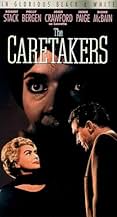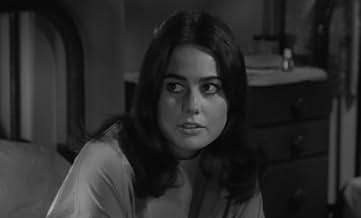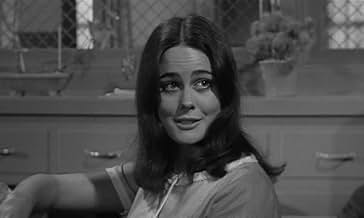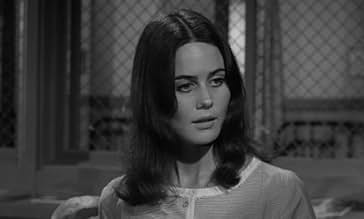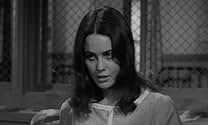IMDb-BEWERTUNG
5,6/10
971
IHRE BEWERTUNG
Füge eine Handlung in deiner Sprache hinzuMedical drama about mentally-ill patients and their professional caregivers, as well as the new group-therapy sessions aiming to replace the traditional physical restraint and electroshock t... Alles lesenMedical drama about mentally-ill patients and their professional caregivers, as well as the new group-therapy sessions aiming to replace the traditional physical restraint and electroshock treatments.Medical drama about mentally-ill patients and their professional caregivers, as well as the new group-therapy sessions aiming to replace the traditional physical restraint and electroshock treatments.
- Für 1 Oscar nominiert
- 5 Nominierungen insgesamt
Ana María Lynch
- Ana
- (as Ana St. Clair)
Pamela Austin
- Student Nurse
- (Nicht genannt)
Brian Corcoran
- Tony
- (Nicht genannt)
George DeNormand
- Doctor
- (Nicht genannt)
Empfohlene Bewertungen
Yes - I've read other critiques posted here. A large consensus focus on THE CARETAKERS being a poor-man's THE SNAKE PIT. Others focus on Joan Crawford being, well - Joan Crawford.
Yes, you can go on about both of those, but I'd like to take a different tact.
First, let me say this film is NOT a 'Grand-Guignol' picture of the era, a 'la WHATEVER HAPPENED TO BABY JANE, or HUSH, HUSH SWEET CHARLOTTE, which several people commenting have alluded it might be, give the fact that Joan Crawford is in it, and this WAS made at that time.
I'd like to start off by saying THE CARETAKERS is an entertaining film, with some fine performances by many familiar faces, amongst them are Robert Vaughn (THE MAN FROM U.N.C.L.E.), Van Willaims (GREEN HORNET), Janis Page, Barbara Barrie, Ellen Corby (THE WALTONS, and my personal favourite - Susan Oliver (THE CAGE - STAR TREK: TOS) and more.
While THE CARETAKERS does come across as a 'message' film, and given the time does seem somewhat campy, some of the treatment ideas proposed for the patients were - at the time - considered radical. Polly Bergen whose character Lorna introduces us to the film (having a breakdown at a packed movie theatre)must've really spent a good amount of time doing research. When Polly's character gets E.C.T., (electroconvulsive therapy - or, as it was better known then SHOCK THERAPY) she twists, pulls. Susan Oliver as the young nurse in training is very uneasy during this, and so was I.
Yes - some of the film does draw comparisons to better known films, but, I think that the film tries to give what was at the time - an 'honest' portrayal of a psychiatric hospital, and the (modern) changes that were taking place at that time - their effect on the doctors and nurses who both administered these treatments, and the effect these treatments had on a group of patients.
If the cast was less professional, it could've easily veered into farce, but given the talent, THE CARETAKERS is an engrossing, if a bit 'soapish' film.
Yes, you can go on about both of those, but I'd like to take a different tact.
First, let me say this film is NOT a 'Grand-Guignol' picture of the era, a 'la WHATEVER HAPPENED TO BABY JANE, or HUSH, HUSH SWEET CHARLOTTE, which several people commenting have alluded it might be, give the fact that Joan Crawford is in it, and this WAS made at that time.
I'd like to start off by saying THE CARETAKERS is an entertaining film, with some fine performances by many familiar faces, amongst them are Robert Vaughn (THE MAN FROM U.N.C.L.E.), Van Willaims (GREEN HORNET), Janis Page, Barbara Barrie, Ellen Corby (THE WALTONS, and my personal favourite - Susan Oliver (THE CAGE - STAR TREK: TOS) and more.
While THE CARETAKERS does come across as a 'message' film, and given the time does seem somewhat campy, some of the treatment ideas proposed for the patients were - at the time - considered radical. Polly Bergen whose character Lorna introduces us to the film (having a breakdown at a packed movie theatre)must've really spent a good amount of time doing research. When Polly's character gets E.C.T., (electroconvulsive therapy - or, as it was better known then SHOCK THERAPY) she twists, pulls. Susan Oliver as the young nurse in training is very uneasy during this, and so was I.
Yes - some of the film does draw comparisons to better known films, but, I think that the film tries to give what was at the time - an 'honest' portrayal of a psychiatric hospital, and the (modern) changes that were taking place at that time - their effect on the doctors and nurses who both administered these treatments, and the effect these treatments had on a group of patients.
If the cast was less professional, it could've easily veered into farce, but given the talent, THE CARETAKERS is an engrossing, if a bit 'soapish' film.
I'm clearly not on the same page as most of the reviewers. First, it's classic Joan Crawford camp. Not only is Joan campy and hilarious as the "head nurse" but the cast of characters kept me enthralled. Look, I don't expect too much "realism" in films about mental illness in the 1960's so I'm not quite getting the disgust that's being expressed.
Marion was also a special treat and her energy shined.
If there is any historical relevance in it is the fact the social norms around the mentally ill were being reconstructed in the 1960's. Not that there was any real legitimacy in how it was portrayed, the fact that it was part of the movie as evidenced by the "borderlines". Even the term "borderlines" is made up, but the point about the conception of the mentally ill having capacity to heal was discussed. I guess 'borderline' was meant to express "only borderline insane".
Look, if you love a good camp film film with great outrageous female characters, this is a great film to watch. A special bonus for those that love Joan Crawford!
Marion was also a special treat and her energy shined.
If there is any historical relevance in it is the fact the social norms around the mentally ill were being reconstructed in the 1960's. Not that there was any real legitimacy in how it was portrayed, the fact that it was part of the movie as evidenced by the "borderlines". Even the term "borderlines" is made up, but the point about the conception of the mentally ill having capacity to heal was discussed. I guess 'borderline' was meant to express "only borderline insane".
Look, if you love a good camp film film with great outrageous female characters, this is a great film to watch. A special bonus for those that love Joan Crawford!
I find this one of the most difficult films of its era to sit through; it is truly nerve-bending, asinine, and infuriating. if you look upon it as camp, it still is difficult to take unless you like the sight of bizarre creature polly bergen constantly throwing fits and screaming (it's truly horrific) and can tolerate the posturing hero and a story and scenes which purport to shed light on mental illness but is totally phony in every particular. diane mcbain is gorgeous and smug; joan crawford and constance ford as butch as they come; janis paige gives the most enjoyable performance in the film, or at least creates a somewhat believable character till she phonies out toward the end. it's pathetic that maltin and others would even consider taking this film seriously. it is a fairy tale put together by fly-by-night producers for a quick buck who wanted to make it look like one of those 50's/early 60's "message" social reform pictures, and people were dumb enough to accept that.
The Caretakers (1963)
It's hard to imagine actually going to the movie to see this movie as a kind of entertainment, because it is more an experience and an emotional plea than a good idea for a first date. There's no question it's powerful, sometimes disturbing, and acted and filmed with intensity. It is, in its own way, a great movie, if you measure it only in terms of being moved. It is also a questionable movie in how it portrays these women, all of whom are "borderline" cases, and none of whom are openly diagnosed for us. Still, some of the most radical behavior is stuff I've seen first hand, and so it isn't completely unreasonable.
The big theme is interesting to see in retrospect: this seems to be about the very first shifts from large hospital care of the mentally troubled to residential care. The key to this is the notion that the patients (they call them "consumers" now) can form small, interactive "families" that encourage emotional and psychological support. It's a kind of giant co-counselling, and I think it's been shown to work in the fifty years since.
There are several equally strong characters as the plot follows one and then another, from patient to nurse to doctor. Joan Crawford gives a steely, power-performance as the head nurse, though only now and then. Herbert Marshall briefly appears as an aging, wise figure in his second to last film. The rest of the cast is made of lesser known actresses who act out the different characters of this woman's ward with disarming conviction (or theatricality, if you don't buy into their illnesses). The lead doctor is played by Robert Stack who never strikes me as quite up to any acting task, but then he's just a figurehead of authority and progress. The movie is in the hands of the women.
Director Hall Bartlett doesn't have much of a career as director, but he's managed to get a terrific cinematographer, Lucian Ballard, to make it a visually brooding and beautiful experience. And the music is by one of the best, Elmer Bernstein. The copy of the movie that streams on netflix has a flaw in the sound which was unfortunate--the quiet portions, including some important conversations, were very quiet, and then when the music and screaming explodes in other scenes it'll hurt your ears. Very very loud. It made for a clumsy viewing, moving the volume up and down, backtracking now and then to see what we missed.
Expect to be impressed and moved and possibly slightly shocked. Overlook some of the neatened up psychology that is a product of both the era and the era the movie was made. And don't look for a surprising plot. Instead you'll get to know a few of the women and when it gets to the final scenes it'll be moving and even a little joyous. If you let it.
It's hard to imagine actually going to the movie to see this movie as a kind of entertainment, because it is more an experience and an emotional plea than a good idea for a first date. There's no question it's powerful, sometimes disturbing, and acted and filmed with intensity. It is, in its own way, a great movie, if you measure it only in terms of being moved. It is also a questionable movie in how it portrays these women, all of whom are "borderline" cases, and none of whom are openly diagnosed for us. Still, some of the most radical behavior is stuff I've seen first hand, and so it isn't completely unreasonable.
The big theme is interesting to see in retrospect: this seems to be about the very first shifts from large hospital care of the mentally troubled to residential care. The key to this is the notion that the patients (they call them "consumers" now) can form small, interactive "families" that encourage emotional and psychological support. It's a kind of giant co-counselling, and I think it's been shown to work in the fifty years since.
There are several equally strong characters as the plot follows one and then another, from patient to nurse to doctor. Joan Crawford gives a steely, power-performance as the head nurse, though only now and then. Herbert Marshall briefly appears as an aging, wise figure in his second to last film. The rest of the cast is made of lesser known actresses who act out the different characters of this woman's ward with disarming conviction (or theatricality, if you don't buy into their illnesses). The lead doctor is played by Robert Stack who never strikes me as quite up to any acting task, but then he's just a figurehead of authority and progress. The movie is in the hands of the women.
Director Hall Bartlett doesn't have much of a career as director, but he's managed to get a terrific cinematographer, Lucian Ballard, to make it a visually brooding and beautiful experience. And the music is by one of the best, Elmer Bernstein. The copy of the movie that streams on netflix has a flaw in the sound which was unfortunate--the quiet portions, including some important conversations, were very quiet, and then when the music and screaming explodes in other scenes it'll hurt your ears. Very very loud. It made for a clumsy viewing, moving the volume up and down, backtracking now and then to see what we missed.
Expect to be impressed and moved and possibly slightly shocked. Overlook some of the neatened up psychology that is a product of both the era and the era the movie was made. And don't look for a surprising plot. Instead you'll get to know a few of the women and when it gets to the final scenes it'll be moving and even a little joyous. If you let it.
I don't know why I like this movie so much. I am sure that it has a lot to do with the fact that I love Joan Crawford, especially during the second half of her career. This particular film, in which she plays a severe and unyielding head nurse at a state psychiatric hospital, seems to have crystallized her persona of later years, much as "Mildred Pierce" did the same for the persona of the younger Crawford.
I have little to add to what other reviewers have said about "The Caretakers", except that it is not for everyone. The acting is over the top. The writing is awful. The treatment of the theme is very hypocritical in the sense that the film seems to mean well on the surface, but as it goes on, one feels that someone--the director, producer, et. al.--did their best to cram in as many gratuitous, sensationalistic moments as possible. This, naturally, defeats the film's original purpose, which was apparently to showcase more progressive methods for treating mental illness than were generally used at the time.
So why do I keep coming back to this picture at least once a year? Well, as I've said, it's mainly for Joan Crawford, but it's also for the film's camp value. EVERYONE here contributes to that, whether they knew it at the time or not. Polly Bergen chews her way through every scene with glorious relish, although she does become more subdued later on. Janis Paige--what can I say? She did a great job of portraying a mouthy slut. And so on and so forth.
I have read at least one account which stated that the filming of "The Caretakers" was besieged by script re-writes, which may explain the less-than-stellar results. Nevertheless, there's never a dull moment here, and as far as I'm concerned, that's a good thing. Movies are, after all, meant to entertain more than anything else, so if you watch this, watch it for that reason. And for good old Joan.
I have little to add to what other reviewers have said about "The Caretakers", except that it is not for everyone. The acting is over the top. The writing is awful. The treatment of the theme is very hypocritical in the sense that the film seems to mean well on the surface, but as it goes on, one feels that someone--the director, producer, et. al.--did their best to cram in as many gratuitous, sensationalistic moments as possible. This, naturally, defeats the film's original purpose, which was apparently to showcase more progressive methods for treating mental illness than were generally used at the time.
So why do I keep coming back to this picture at least once a year? Well, as I've said, it's mainly for Joan Crawford, but it's also for the film's camp value. EVERYONE here contributes to that, whether they knew it at the time or not. Polly Bergen chews her way through every scene with glorious relish, although she does become more subdued later on. Janis Paige--what can I say? She did a great job of portraying a mouthy slut. And so on and so forth.
I have read at least one account which stated that the filming of "The Caretakers" was besieged by script re-writes, which may explain the less-than-stellar results. Nevertheless, there's never a dull moment here, and as far as I'm concerned, that's a good thing. Movies are, after all, meant to entertain more than anything else, so if you watch this, watch it for that reason. And for good old Joan.
Wusstest du schon
- WissenswertesJoan Crawford went out of her way to help an aging Herbert Marshall with his lines. She also arranged to have his scenes filmed first so he could leave the set early in the day as he was an old friend and in ill health.
- PatzerAs Lorna runs into the hospital, there's nothing outside the door. But the shot from inside shows a small wall just outside the door which she would have had to jump over or go around to enter.
- Zitate
Dr. Donovan MacLeod: Truth Marion, that's all we're looking for.
- VerbindungenFeatured in Hollywood: The Great Stars (1963)
Top-Auswahl
Melde dich zum Bewerten an und greife auf die Watchlist für personalisierte Empfehlungen zu.
Details
Box Office
- Bruttoertrag in den USA und Kanada
- 2.050.000 $
- Weltweiter Bruttoertrag
- 3.160.000 $
- Laufzeit
- 1 Std. 37 Min.(97 min)
- Farbe
- Seitenverhältnis
- 1.66 : 1
Zu dieser Seite beitragen
Bearbeitung vorschlagen oder fehlenden Inhalt hinzufügen

